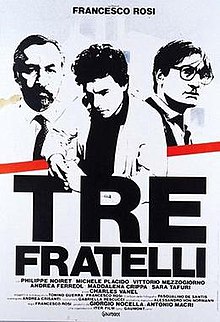fiction.wikisort.org - Movie
Three Brothers (Italian: Tre fratelli) is a 1981 Italian film based on a work by Andrei Platonov. It was directed by Francesco Rosi and stars Philippe Noiret, Vittorio Mezzogiorno, Michele Placido and Charles Vanel.
| Three Brothers | |
|---|---|
 Film poster | |
| Directed by | Francesco Rosi |
| Written by | Tonino Guerra Francesco Rosi |
| Produced by | Giorgio Nocella Antonio Macrì |
| Starring | Philippe Noiret Michele Placido |
| Cinematography | Pasqualino De Santis |
| Edited by | Ruggero Mastroianni |
| Music by | Pino Daniele Piero Piccioni |
Release date |
|
Running time | 113 minutes |
| Countries | Italy France |
| Language | Italian |
The film won the Boston Society of Film Critics award for Best Foreign Film, and the Nastro d'Argento for Best Director and Actor. It received a nomination for an Academy Award for Best Foreign Language Film.[1] It was screened out of competition at the 1981 Cannes Film Festival.[2]
Plot
This article describes a work or element of fiction in a primarily in-universe style. (October 2009) |
In a farmhouse in southern Italy, an old woman, the matriarch of an Italian family, dies. Her husband, Donato, summons their three adult sons, each of whom are facing difficult personal problems, back to their farmhouse from the cities where they now live. One of their sons, Raffaele, a judge living in Rome, is considering presiding over a terrorism case for which he would risk assassination. Another son, Rocco, who lives in Naples, is religious and works as a counselor at a boys' correctional institute, so that he can fulfill his dream of helping troubled teenagers. The third son, Nicola, who lives in Turin, is a militant factory worker involved in a labour dispute, and is dealing with a failed marriage. Each of the men grieves in his own way, while also wrestling with their other emotional issues.
The sons recall the past and engage in reveries of what may come: Raffaele imagines his death, Rocco dreams of lifting the youth of Naples out of violence, drugs, and corruption, Nicola pictures embracing his estranged wife. Meanwhile, the old man and his young granddaughter, Nicola's child, explore the rhythms of the farm and grieve together.
Cast
- Philippe Noiret - Raffaele Giuranna
- Michele Placido - Nicola Giuranna
- Vittorio Mezzogiorno - Rocco Giuranna and young Donato
- Andréa Ferréol - Raffaele's wife
- Maddalena Crippa - Giovanna
- Rosaria Tafuri - Rosaria
- Marta Zoffoli - Marta
- Tino Schirinzi - Raffaele's friend
- Simonetta Stefanelli - young Donato's wife
- Pietro Biondi - first judge
- Charles Vanel - Donato Giuranna
- Accursio Di Leo - first friend at bar
- Luigi Infantino - second friend at bar
- Girolamo Marzano - Nicola's friend
- Gina Pontrelli - the brothers' mother
See also
- List of submissions to the 54th Academy Awards for Best Foreign Language Film
- List of Italian submissions for the Academy Award for Best Foreign Language Film
References
- "The 54th Academy Awards (1982) Nominees and Winners". oscars.org. Retrieved 2013-06-15.
- "Festival de Cannes: Three Brothers". festival-cannes.com. Retrieved 2009-06-07.
External links
- Three Brothers at IMDb
На других языках
- [en] Three Brothers (1981 film)
[ru] Три брата (фильм, 1981)
Вольная экранизация рассказа Андрея Платонова «Третий сын». Перенеся действие из советской глубинки в южную итальянскую деревушку и наполнив фильм реалиями итальянских 1970-х годов (терроризм, Красные бригады, политическая борьба, безработица, сексуальная революция), известный режиссёр сохранил пронзительную платоновскую интонацию и «простую» истину: смысл человеческой жизни — это любовь.Другой контент может иметь иную лицензию. Перед использованием материалов сайта WikiSort.org внимательно изучите правила лицензирования конкретных элементов наполнения сайта.
WikiSort.org - проект по пересортировке и дополнению контента Википедии